Peter MALONE
Saturday, 09 October 2021 13:01
War and Peace/ BBC
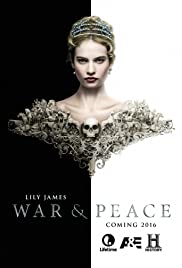
WAR AND PEACE
UK, 2016, 372 minutes, Colour.
Paul Dano, Lily James, James Norton, Adrian Edmondson, Aisling Loftus, Greta Scacchi, Jack Lowdon, Tuppence Middleton, Aneurin Barnard, Jesse Buckley, Olivia Ross, Tom Burke, Jim Broadbent, Callum Turner, Rebecca Front, Stephen Rea, Gillian Anderson, Matthieu Kassovits, Brian Cox.
Directed by Tom Harper.
This is a lavish six-part BBC drama. Previous versions of War and Peace include the 1956 King Vidor version with Henry Fonda and Audrey Hepburn. There was also a lavish Russian production during the 1960s.
With such a long running time, this version was able to incorporate the key sequences in Tolstoy’s large novel, the characters, the events, the atmosphere of the Napoleonic wars, sets and decor, invasion, the Russian experience of the war, the defeat of Napoleon and his retreat, the consequences of war and the move towards peace. The dialogue also provided opportunity for reflective sequences echoing the ruminative and philosophical chapters of the novel.
Lily James, very popular in cinema films and on television, was Natasha. James Norton was the dashing but shamed hero, Andrei, contrasting with Paul Dano as the philosophical Pierre.
The direction was by Tom Harper and there was a large cast of international character actors in support.
1. The status of the novel, of Tolstoy and his contribution to literature and human thought?
2. The 19th century, the vision of Russia, Russian society, classes, culture, the experience of war?
3. The background of Napoleon, his ambitions, to conquer the world, across Europe, moving east, to Russia and the invasion? The battles, Austerlitz and Borodino? The visuals of Napoleon, in command, his offices, strategies, of the battle field? The desire to conquer Moscow, his advance, the battles on the way, setting fire to Moscow, his presumptions, lack of supplies, the retreats?
4. Tolstoy, his ruminations on the meaning of life, the philosophical essays in the novel? Their being transferred to the character of Pierre, ultimately towards Andrei?
5. Miniseries, the possibilities of six hours for narrative, the visuals, the characters and situations? Costumes and decor? The wealthy classes and their life, socials? The contrast with the poorer, the serfs, the losses during the war, fleeing their homes and villages? War and its aftermath on each class?
6. The narrative centring on Pierre, Paul Dano’s presence and performance? His background, illegitimate, his father, the will, leaving him his possessions? The background of the various members of the family, their schemes to get the inheritance? The reactions, plans?
7. Pierre, as a character, his age, awkwardness, drinking, irresponsible? The arrangement for the marriage with Helene, his relationship with her, an arrangement, the effect on each of them, living together? Her promiscuity and betrayals? His disappointment, disillusionment?
8. The Rostova’s, the father, genial character, his optimism? The mother, practical, concerned, hard, intervening? The decisions and the concerns? Nikolai, young, his position in the family, getting a posting on the war, on the battlefield, his work, delivering messages? His friend and his being led astray, the gambling sequences, impetuosity, the debts, going to his father, his father accepting them? Yet the poverty of the family? The invasion, the family and the experience of war, losing the house? The continued laments of the mother, her hardness and decisions? Sonia always present, Nikolai and his relationship with her, his roving eye? Her fidelity? His meeting Maria, attraction to her? The family setting for Natasha?
9. Natasha, Lily James and her screen presence, age, vivacious, her place in the family, her wisdom? Her continued friendship with Pierre and admiration? The encounter with Andrei, meeting, the possibilities, his father demanding his absence for a year? The effect on Natasha, letters, the seducer and his effect on her, society, her being prepared to go with him, moral and emotional confusion, her ultimate shame, supported by Sonia? The return of Andrei, the breaking of the relationship? The war, losing the house, Andrei arriving, care for him, reconciliation, his death? Pierre coming to her, the relationship and the marriage?
10. Russian society, the hostess, the balls, the meals, music, the effect of wealth, gossip, the various protégés? The effect of Napoleon’s attack, the burning of Moscow?
11. Pierre, welcoming his friend from the war, sponging on him, the betrayal, with Helene? The buildup to the duel, the challenge, Pierre and his awkwardness, his friend wounded? Later appearing fighting in the war?
12. The Russian general, his strategies, with Andrei, with Nikolai, his being urged to attack, the various battles, the Prince and the demands? The men, Napoleon and his attack, the defeat, the fields of the dead? His for telling that Napoleon would eventually retreat?
13. Pierre, on the farm, meeting the Masons, his conversion experience, the effect, his concern, altruistic?
14. Andrei, his wife, pregnant, with his father, the difficult birth, his presence, her death? Andrei and his involvement with the battles, the initial wounds, wounded again? His wife’s death, going to a hermit, working on his farm, his demanding father, delivering the message, meeting the Rostov’s, the attraction to Natasha, away for a year, longer? His father’s death? The return, Natasha and her care, his death?
15. Andrei’s father, bombastic, the running of the household, his love for his son, his dismissing of Maria? Orders, eccentricities? Expectations about the war, the war effort, to attack Napoleon, his collapse and death?
16. Maria, as a wallflower, in the household, her French companion, the father and his nomination, the rogue and his proposal, her refusal? The encounter with Nikolai? Leaving home, the serfs, the Rostov’s, care, her father’s death?
17. The combination of Napoleon’s invasion and his retreat?
18. The picture of the new Russia, Pierre and Natasha, the family? Hope?
Published in Movie Reviews
Published in
Movie Reviews
Saturday, 09 October 2021 13:01
Bright

BRIGHT
US, 2017, 117 minutes, Colour.
Will Smith, Joel Edgerton, Noomi Rapace, Edgar Ramirez, Lucy Fry, Veronica Ngo, Happy Anderson, Ike Barinholtz, Brad William Henke, Jay Hernandez.
Directed by David Ayer.
One of the main attractions was the presence of Will Smith as the Los Angeles detective. His partner, an Orc, was played by Joel Edgerton. Also in the cast was a mysterious presence, for good or for evil, played by Noomi Rapace.
The intriguing aspect of the film was the partnership between the human and the Orc, the human wondering whether he was being betrayed by the Orc, their working together, the intrusion of characters from the supernatural world, the Lord of Darkness.
The film was directed by David Ayer, best known for such films as The Suicide Squad, and tough dramas like And off Watch and Harsh Times.
Because of the popularity of the film, the blend of the realistic with the fantasy, there were discussions about a sequel.
1. The title? The world of magic, power, a wand, the bearers of the wand?
2. The blend of fantasy and reality? Humans in Los Angeles, the city itself? Yet the world of alternate creatures, their nature, appearance, powers? An atmosphere of an alternate world?
3. Los Angeles, recognisable, differences, the world of the Orcs, the other creatures, homes, conflicts? The musical score?
4. The police story, partners, going into action, accountability, authorities, good cops, corrupt cops? Work, tensions? The public and prejudice against Orcs?
5. Will Smith as Ward, his character, his being wounded, blaming Jakoby for failing him? Internal affairs, questions, criticisms of Jakoby?
6. Nick Jakoby, Joel Egerton and his make up, the walk, his character, integrity as a policeman, the first policeman, detested by the humans, the Orcs against him for becoming a policeman? Work, Ward being wounded, Jakoby failing, letting the young Orc go because he was innocent?
7. The other world, Shield of A light? Talk of the Dark Lord and his being resurrected? The encounter with Tikka and the wand?
8. The crisis, the call for backup, the police, wanting to shoot both Ward and Jakoby, the alert to the Hispanic gang, the character of Poison, wanting the wand to walk again?
9. Jakoby, his work, explanations toward, the young Orc and his innocence? The later repercussions when they were saved by this young Orc?
10. The emergence of a Leilah, appearance, character, malice, her associates, Rodriguez, his death? The links with the investigating police?
11. The Orcs, the capture of Ward and Jakoby, Mikey, his letting them go?
12. Jakoby, the wand, Tikka and Jakoby’s resurrection? The prophecies, leadership?
13. Leilah, the conspirators, with Tikka, the intrigues?
14. Tikka, confronting Leilah, the siege, the explosion? The discovery that Ward was a Bright?
15. The buildup to the finale, collaborations, Magic, explosions?
16. Ward and Jakoby, going about their ordinary business, the investigations, the honours, the corrupt cops also honoured? The future?.
Published in Movie Reviews
Published in
Movie Reviews
Saturday, 09 October 2021 13:01
Papillon/ 2018
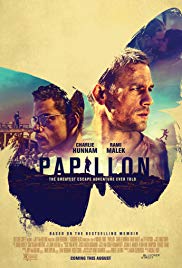
PAPILLON
Czech Republic/Spain, 2017, 133 minutes, Colour.
Charlie Hunnam, Rami Malek.
Directed by Michael Noer.
Papillon was one of the big films of the early 1970s, starring Steve Mc Queen in the title role, working along with Dustin Hoffman. There was a cinema interest in the penal colony of Devil’s Island in the 1970s, including an action show with Jim Brown, I Escaped from Devil’s Island.
Here is a 21st-century remake which recreates the atmosphere of the penal colony but also extends the narrative to Henri Charriere’s life and career after his escape and return to France. The film is based on his autobiography, Papillon and Banco.
For the remake, the leading actors were better known on television than on the big screen, Charlie Hunnam known for Sons of Anarchy and Rami Malek for Mr Robot. Malek was to receive the Academy Award the following year for playing Freddie Mercury in Bohemian Rhapsody. Charlie Hunnam continued a successful career in films, beginning in England, returning to England for The Gentleman and Australia for The True Story of the Kelly Gang.
The film is of interest for its picture of the French criminal world, for the re-creation of Devil’s Island, for dramatising the later career of Henri Charriere.
1. A true story? Autobiography? The popularity? The 1970s film version?
2. The title, the name, the name of the Butterfly? The use of the images of the Butterfly?
3. Paris, 1931, the safe cracker, his robberies, giving the proceeds to his boss, the threats from the boss, seeing the torture of the informant? his girlfriend, going out on the town, the cinema, the man seeing the girlfriend with a necklace, reporting them? The police, coming to the apartment, the arrest, in jail, his being framed for the murder of the informant?
4. The prisoners being sent to the owner, the French prison system, administration? The men in their uniforms, caps, assembled like military in lines at the wharf (and the later credits seeing the newsreel of the times)? On the ship, crowded, the fights, the guards and discipline, the suspect with his Jules in his belly, the thugs slitting him? Henri, the information about danger, his background as a forger, Henri offering his help, protection?
5. Their arrival in Guinea, the officials and speeches, no escape? The harshness of the administration, and life, work? Friendships and bonds, mistrusts?
6. Henri as a character, strong, physically strong? The contrast with Dega, small, his spectacles, a low key person?
7. The friend on the boat, his attempts at escapes, killing guards, the prisoners assembled, the guillotine, his execution, the head in the box? Henri and Dega having to carry the body, take a exhausted, the guard whipping him, Henri getting the rock, hitting the guard, his attempted escape, the boat, the man and his having over to the police?
8. Time in the cell, solitary, the authorities wanting to break him, the darkness, the food, the isolation, his doing exercises, becoming it? The gifts of the coconut with the note? His not revealing the name? The interrogation, the threats, on half rations, being deprived of light, Time passing, his getting out, in the hospital?
9. Dega, his jobs, with the officials, visit to the hospital, Henri pretending to be mad, planning his escape?
10. Getting the tranquilizing pills and keeping them? The big turnkey and his threats of raping the young man? The conflict with associations in the past, whether he was to be trusted or not? Their forming a group? Henri is a mouse to be no killing? The issues of money? The contact with the both?
11. The night on the escape, the screening of King Kong, the turnkey and the attack on him, the rescue of the young man, getting the keys? Dega and his putting the drugs and the drinks for the authorities? The rain pouring, the lights going out? The decision to go, jumping from the wall, Dega injuring his ankle, getting away, being apprehended by the owner of the boat, the other man and his threats, the getting the boat, going to see, scooping the water, mending the writer? The mixing, too much weight, wanting to throw Degas\ overboard? The threats, the boy going overboard? Dega and his reaction? The vicious stabbing of the convict?
12. The storm, the difficulties at sea? Finding themselves on lantern rescued, in Colombia, working with the natives, the nuns and talking about repentance? Henri trying to leave, seeing the authorities in their car, returning, the boy being shot? Their being arrested?
13. Henri in prison, for five years and his cell, still resistant, transferred to Devils Island, finding day get there? That life, isolation, the man hanging himself, standing on the cliffs, looking at the tides?
14. The plan for the raft, to jump, using the tides? Dega deciding to stay? the raft?
15. Settling in Venezuela, the transition to 1969, the manuscript of his autobiography, the publisher in France? The government allowing him to return? The publication of his book, the sales, fame, the film version?
16. The 21st-century treatment of Henri Charriere’s life? the reputation of the 1970s film and its stars? This version in its own right?
Published in Movie Reviews
Published in
Movie Reviews
Saturday, 09 October 2021 13:01
1922/ 2017
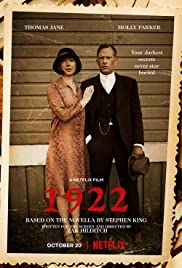
1922
US, 2017, 102 minutes, Colour.
Thomas Jane, Molly Parker, Dylan Schmid, Kaitlyn Bernard, Neal Mc Donough, Brian d'Arcy James.
Directed by Zach Hilditch.
1922 is based on a Stephen King novel. For over 40 years, there has been a huge number of adaptations of Stephen King novels for screen and television.
This film begins with a drama and ultimately moves to horror.
The setting is a farm, managed by husband and father, Thomas Jane. His young son is played by Dylan Schmidt and his wife, who wants to leave the farm and go to the city, is played by Molly Parker.
The film takes on a grim tone when the farmer decides to murder his wife and makes his son complicit. His wife’s body is dumped by a roadside, leading to an investigation by the sheriff. While the son continues to work with his father, he falls in love with a neighbouring girl and they eloped. They also blame him for the murder of the mother.
The flight has the touch of the Bonnie and Clyde about it. But, the father, remaining at the farm, going into debt, trying to cope, descends further and further into madness.
The film was directed by Australian director, Zack Hilditch (These Final Hours, Rattlesnake).
1. A Stephen King story? Outside New England? The Nebraska settings, the flat plains, the crops, the beauty of the seasons and the skies? The musical score?
2. 1922, the town, the farms and houses, the vehicles? Costumes and decor?
3. The framework of Wilfred’s confession? Everything else seen in flashback?
4. Wilfred, Thomas Jane’s performance, his age, experience, marriage, the tensions with his wife, supportiing his son, wanting him to inherit? The crops, the work on the farm, his age, the property, wanting to buy his wife’s property?
5. His wife, age, experience, not wanting to be on the farm, angers, her wanting to leave, to start a dress shop? Not wanting to sell? Her relationship with her son, slapping him?
6. The decision to murder, father and son agree, getting his wife drunk, pretending to agree to moving to the town? The visual viciousness of the murder, the blood, body down the well, the increasing number of rats, the cow on the top of the well, falling in, Wilfred shooting the cow?
7. The atmosphere of the haunting, his wife’s presence, the visuals, the number of rats, the increasing? Wilfred and his guilt? Acknowledging his motivations, hatred, greed, wanting an inheritance for his son?
8. The son, his age, experience, devotion to his father, tension with his mother? The girl, together? Her sensing something different about him after the death? The fact that she was pregnant, her being sent to the home for unmarried mothers, the father explaining this to Wilfred? Harry, his wanting to escape from home, his leaving, the note, the hold-up, getting the girl, the journey of their escape, the dangers, her being shot, her death?
9. The sheriff, his visits, interrogations? The banker and his concern about the sales? Wilfred not offering him a drink? The sheriff returning, the later information, about Harry and the hold-up, the final news about his wife, identifying her by her teeth? Yet her being down the well?
10. Wilfred, physical and moral collapse, the failing farm after the benefit, the issue of the loan, the failure, his drinking, his increasing fears, the seasons, the ice and snow? The increasing number of rats, tormenting him, injuring his hand?
11. His going to the town, drinking, working in the factory?
12. The story of retribution, haunting? And Stephen King touches, especially with the horror of the rats?
Published in Movie Reviews
Published in
Movie Reviews
Saturday, 09 October 2021 13:01
Little Woods
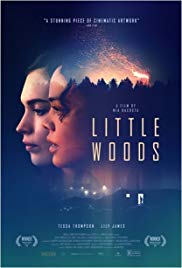
LITTLE WOODS
US, 2018, 104 minutes, Colour.
Tessa Thompson, Lily James, Lance Reddick, Luke Kirby, James Badge Dale.
Directed by Nia Da Costa.
An unusual story set on the American- Canadian border, in North Dakota.
This is the story of two sisters who have troubled lives. They have been adopted and come from different ethnic backgrounds. Tessa Thompson plays Ollie, involved in cross-border activity, transporting medication across the borders, helping out people in trouble. Lily James plays Deb, pregnant, impractical, depending on her sister for some kind of help.
While Deb loses everything she possesses, Ollie goes back into her smuggling activities to get money to help her sister, willing to undergo difficult travels and harsh encounters.
Tessa Thompson and Lily James give strong performances, eliciting sympathy from the audience, appreciating the struggles and financial difficulties.
1. The title? The two sisters? The town and its surroundings, the American-Canadian? border, the woods? Burying pills and medication in the woods, recovering them?
2. The contemporary American setting, North Dakota, the Canadian border, the opening and closing of the film, the white post, the woods? The town and industry? Makeshift homes and dormitories? Apartments? Offices, canteens? Atmosphere of realism? The musical score?
3. The focus on the two sisters, their bonds, both being adopted, different ethnic backgrounds? Their interdependence, Ollie and her initiatives, exasperation, wanting to move on? Deb, intelligent, but impractical, relationships, son, pregnant?
4. Ollie’s story, the burying of the medications? Her experience, cross-border activities, illegal, Canadian medication benefits, for poorer Americans? The way of life, her friends? Carter and his advice and care for her? Interactions with the men, with Deb’s partner? The pressures on her, financial, the contacts for moving the medication? The contacts over the border? Dangers? Her changing her plans, wanting to help Deb? The abortion? The plan for the false documents? Hiding the car in the woods, going into Canada, waiting for Deb? Doing the deals, the contacts in Canada, going to the abortion clinic, the friend minding Deb’s son? Coming back home – to what future?
5. Deb, adopted, her relationships, and abusive partner, love for him, attacking him? Her devotion to her son? Wanting to go to college? It difficulties with money, the trailer, the warning is that it will be towed, coming back in its disappearance, the fact that all the money was in the trailer, Ollie tracking down, investigating, medication and money gone? Deb and her inability to make ends meet, pregnant, consulting the medical help, $8000 to give birth, the decision about the abortion, discussions with Ollie? Going with her, getting the false documents, her being exploited? Going to the clinic, the false documents, being accepted? The impact of the experience? The return, with her son – her future in college or not?
6. Carter, the sympathetic advisor, trying to help Ollie?
7. The man in the town, Deb’s partner, drugs, the contact for the medication, the plans?
8. A different perspective on ordinary Americans living in the back blocks, trying to survive, trying to manage, illegal means, the effect on their lives and prospects?
Published in Movie Reviews
Published in
Movie Reviews
Saturday, 09 October 2021 13:01
He Never Died
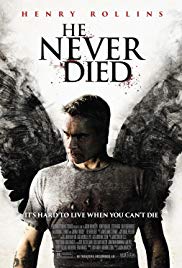
HE NEVER DIED
US, 2015, 99 minutes, Colour.
Henry Rollins, Kate Greenhouse, Boo- Boo Stewart, Jordan Todosey, Don Francks.
Directed by Jason Krawczyk.
This is a supernatural film with a touch of horror and a number of twists.
It is a star vehicle for character actor, Henry Rollins. He plays Jack, the seeming down and out character, in bars, playing bingo with the church, dependent on associates, becoming entangled with a woman, Kara, in a situation where his daughter is abducted by thugs.
There are many mysteries about Jack, his character, his relationship with people, some relics of his past.
The revelation of who he was, an immortal character, punished, with the Mark of Cain, destined to live through the centuries, having to cope – but the issue of whether he was redeemable.
Offbeat, and a plot with provocative aspects.
1. The title? The immortal man?
2. The final revelation of who he was, in the Bible, Cain, murdering a ball? The Mark of Cain? Doomed to live forever? His explanation to Kara of all the occupations he had? An ordinary man? Extraordinary? Able to be wounded but never dying? The touch of the vampire? Eating his victims, drinking the blood? Survival?
3. New York City, apartments, the streets, the diner, the clubs, the world of criminals? The musical score?
4. Jack, as a character, morose, laconic, seemingly wanting to do good to people, his reliance on Jeremy, Jeremy and his debts, being attacked by the thugs, Jack’s interventions? The surprise that Jack had a daughter, separated from his wife, her phone call, his daughter wanting to meet him? At the diner, the conversation, her way of life, boyfriend, drugs? Going home with him? The possibility for bonding?
5. Jack, detached, not connecting with people? The irony is going to the bingo, the bingo caller? Taking his daughter? Her abduction?
6. Kara, at the diner, friendly, her story, ambitions, divorce, waitress? Bonding with Jack, the offer to go to the bingo? His standing her up? The other members at the diner, attitudes towards Jack? His visits, abstemious, drinking, his change of heart?
7. The abduction of his daughter, his quest, entanglements with the various thugs, harsh treatment of them, violence, deaths? The link with the club owner?
8. Jack tracking people down, the violent confrontations?
9. Kara, her being mystified, witnessing Jack being shot, not wanting to help, his being persuasive, her driving, going to his apartment, the relics from the past, his explanations, the money? The parked car, her participation in the rescue?
10. Jack, the final confrontation, Death, appearance, doom?
11. The final rescue, Jack and his continuing to live out his immortality?
Published in Movie Reviews
Published in
Movie Reviews
Saturday, 09 October 2021 13:01
Brawl in Cell Block 99, The
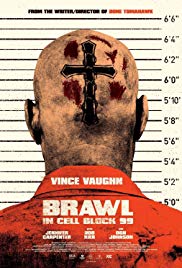
THE BRAWL IN CELL BLOCK 99
US, 2017, 132 minutes, Colour.
Vince Vaughn, Jennifer Carpenter, Don Johnson, Udo Kier, Mark Lucas, Dion which she had to.
Directed by S. Craig Zahler.
This is a very tough and violent film, expertly made, strong performances. It was written and directed by S. Craig Zahler, who has made quite some impact with his films, starting with Bone Tomahawk, a revisionist and harsh Western, and the crime drama, Dragged across Concrete.
The latter film starred Vince Vaughn as does this one. He plays a mechanic who loses his job, is a drug mule. He goes back to his drug boss and takes on a number of missions, in one of which he is trapped by the police, the drugs thrown overboard, a shooting confrontation, another drug mule is killed, Bradley arrested and sentenced to 7 years in prison.
The prison is harsh, especially as ruled by the warden, played rather sadistically by Don Johnson.
Bradley and his wife, Jennifer Carpenter, have initial difficulties with her infidelity but have reconciled and she is pregnant. Messages come to the prison, especially in the form of the sinister Placid Man (Udo Keir) making demands on Bradley with threats to the unborn child and his wife.
There are various complications in the prison, the cells of which are disgusting, and a message that he has to get himself to Cell 99. With the help of a guard, he finally reaches this destination only to find the drug bosses there and his being tortured.
Using some ingenuity to minimise the torture, he is able to turn the tables on the bosses – and the Placid Man is killed.
While the film can be admired, it is a very strong experience to watch.
1. The title? A warning about prison films, violence?
2. The title, the film better than the title? Yet audience sensibilities about violence, extreme violence, especially with violence on faces and killing?
3. Vince Vaughn as Bradley, strong presence and performance, age, experience, his work, his marriage and love for his wife, the miscarriage and its effect, his work in the garage after the drug deliveries, his being fired, his stern and smiling appearance, the tattle of the Cross on the back of his head, bought? His reaction to his wife, her confession, smashing the car, the confrontation the house, yet they’re taking a new chance?
4. Going back to drug deliveries, his friend and the setting up of the situation, his wife being pregnant again, needing the money? The drug lord, his guards and thugs, tough, his authority? The episode, the boat, Bradley in charge, asserting his authority, the criminals, the diver, the recovery? The raid, the police, the shootings, Bradley and his decision to shoot, the deaths, his surrender, his arrest?
5. Bradley being interrogated, honest, but not giving any information? Sentenced to prison, the processes of entry, giving up his ring, the demand for stability? The old criminal in prison for a long time, helping him settle, the range of wardens, the cell, not wanting any food, the old man giving him the food? Life in prison? The Garden the issue of wanting him to box? The news of the visit, hope for the doctor, the pregnancy, the sinister visitor, the explanations and threats, the abduction of his wife?
6. The visuals of his wife being abducted, held? Bradley and his decision, morality, murder, saving his wife? His tactics, the brutal bashings of the guards, his transfer?
7. His being transferred, hard and harsh stances, the new warden, his style, the confrontation is, the ridicule, the physical torment? The disgusting cell, the humiliations? The other guards??
8. Bradley inquiring about the target, no information? The realisation that he was being set up? The boss and his associates in jail, very easy life, wanting revenge? The torments for Bradley, the Taser and his being shaken, his being bashed?
9. Bradley and his decisions, tying up the guards, the confrontation, the brutality of his foot stomping on faces and heads?
10. Forcing the boss to phone, getting his wife freed? His associate, the shooting of the sinister man and the abortionist?
11. Bradley, prepared to give up, the arrival of the warden the guards, discussions, negotiations, the phone call in the time? Reassured by his wife?
12. Willing to give himself up, his death?
13. A tough film, strong in its portrait, issues of justice, issues of prisons, issues of violence? And the moral dilemma for Bradley about saving his wife?
Published in Movie Reviews
Published in
Movie Reviews
Saturday, 09 October 2021 13:01
Centre of My World
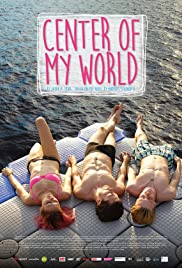
CENTRE OF MY WORLD
Germany, 2016, 115 minutes, Colour.
Louis Hoffman, Jannik Schumann, Ada Philine Stappenbeck, Sabine Timoteo, Bendix Hansen, Sarah Fuhrer.
Directed by Jakob M Erwa.
A film about young adults, their background and family influences, relationships, sexual orientation, confusion and complexities.
The story focuses on a young man, Phil, who encounters another young man, Nicholas, who becomes the centre of his world. The film provides quite some background about Phil and his dysfunctional family, his mother and her many relationships. Expectations are put on him.
Nicholas is a fellow student and they become involved. There are also two young women whom the young men encounter leading to complex relationships, sexual encounters, disillusionment and challenge for Phil.
These universal issues are explored in a German context.
1. A film about family, dysfunctional, siblings, erratic mother, growing up, sexual orientation, consequences?
2. The title, the focus on Phil, as a little boy, his relationship with his sister, his mother and her range of boyfriends, their needing a father, Kyle and the hopes, Glass and her driving the men away? The bonding between brother and sister?
3. The focus on Phil, adolescent, at school, at home, with his sister, his friendship with Cat, his sexual orientation, memories of the past, the encounter with Nicholas at the
supermarket? His mother being aware? Supportive? His sister?
4. The structure of the film, Phil an adolescent and his issues, the continued flashbacks into the past, the portrait of Glass, the images of the brother and sister, their love, dependence, clashes?
5. Glass, her background, erratic, relationships, the new relationship and Phil bonding, their working together, jobs? A father figure? His having to deal with Glass?
6. Nicholas coming on to Glass, Phil and his infatuation, the later meetings, Nicholas and his setting up situations, Phil and his response? The effect on him?
7. The sexual encounters, the effect on Phil, some kind of love and fulfilment?
8. His introducing Cat, the threesome, time together? Phil and the occasions of meeting with Nichols, the sexual encounters and the effect?
9. Phil, discovering Nicholas with Cat, his shock? The consequences?
10. Nicholas, his character, the touch of the callous, bisexual activity, aware of Phil’s love, but wanting only friendship, sexual occasions, not love?
11. Phil, Nicholas being the centre of his world, the disillusionment, his trying to accept this? His future?
Published in Movie Reviews
Published in
Movie Reviews
Saturday, 09 October 2021 13:00
Close
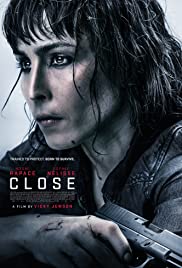
CLOSE
UK/US, 2019, 94 minutes, Colour.
Noomi Rapace, Sophie Nelisse, Indira Varma.
Directed by Vicki Jewson.
Noomi Rapace has a strong role in this action drama, a bodyguard, a strong-minded woman who is alienated from her own family.
She is employed to be a bodyguard to a young woman in Morocco. They clash, the young woman not wanting a bodyguard. Also complications with her family, especially her stepmother.
The film then explores various aspects of North Africa and politics in the Middle East. Many complexities – and, even in the plot, with dangers to the bodyguard, but her rising to the occasion. And, some final twists in what is actually going on and a change of sympathies towards the stepmother.
1. An action story, a bodyguard, security and protection, the connection with multinationals?
2. The Middle East and opening, the threats, the ambush, Sam and her quick thinking, shooting, protection? The return home, her company, security and bodyguards? Her contacts?
3. To Europe, to the UK? The action in Morocco, the desert, the luxury home, the cities? The musical score?
4. Introduction to Sam, her capacity for action, the journalists and saving them, her husband, the phone calls from her daughter and her ignoring them?
5. Zoe, spoilt, her relationship with her father, her stepmother, her father’s death, the funeral, the reading of a will, and the bequest to her? Her stepmother and her reaction? Issues of selling, takeover, rival firms and representatives?
6. The situation, the hiring of Sam? The meeting with Zoe, the clash of personality, Sam’s detachment, going to the dance, warding off the man? Doing her job?
7. The abduction, the consequences, the threats to Zoe, Sam in action?
8. The range of threats, dangers, escapes?
9. The stepmother, her assistance, the variety of thugs, the paid-off police, the various shifts of sympathies and revelations about criminal activity?
10. The attack, the shooting, Zoe shooting the policeman, the response, the media, the television discussion about the selling of the company, the threats to the sale? Audience assumptions about the stepmother and the abduction – but the rival company and the attempt to bring down the price?
11. The two women going to the house, the defence, the various attacks, security, the cameras, Sam trapped in rooms, watching?
12. Sam, the representative of the company, the tensions, his death?
13. The various traps, the various escapes, the underwater sequence and the drowning of the thug? Zoe and her initiatives?
14. The stepmother, her men, the situation for the sale, the switch in sympathies?
15. Action, Mission accomplished, Zoe and the bond with Sam, and telling her to contact her daughter?
Published in Movie Reviews
Published in
Movie Reviews
Saturday, 09 October 2021 13:00
Siege of Jadotville, The
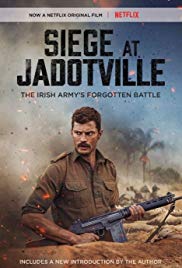
THE SIEGE OF JADOTVILLE
Ireland/South Africa, 2016, 108 minutes, Colour.
Jamie Dornan, Mark Strong, Danny Sapani, Guillaume Canet, Michael Mc Elhatton, Fionn O' Shea, Sam Keely, Ronan Raftery, Jason O' Mara,
Directed by Richie Smyth.
This film is a very interesting invitation to go back into African history in the middle of the 20th century. It was well acclaimed and won a number of Irish film and television awards.
The film provides the political background of the Congo and the assassination of Patrice Lumumba. It also highlights the political activity of Moise Tshombe (Daniel Lapani) and his secession, and the exploitation of the uranium mines. This is of concern to the United Nations, especially General Secretary, Dag Ham, who enlists the help of diplomat, Conor Cruise O’Brien? (Mark Strong) with a warning that the situation has the potential for World War 3.
In the meantime, we are introduced to Irish troops, led by Pat Quinlan (Jamie Dornan), their training in Ireland, the farewells from family, their being posted to the Congo, the initial clashes with the rebels, the work by Indian UN peacekeepers.
Much of the film shows the Irish and their mission, Quinlan and his leadership, digging trenches around the military establishment. Quinlan also meets a French mercenary (Guillaume Canet), enlisted to protect the interest of the rebels and the mines.
Ultimately, there is an attack, the Irish digging in, repelling waves of attack, a state of siege, but, ultimately, their having to surrender. At first, their reputation is at stake because of the surrender but, in later decades, their work was acknowledged.
1. A narrative based on actual events? The independence movements in Africa? In Congo, civil wars and secession? The United Nations, peacekeeping troops, the Irish presence? Dag Hammarskjold and the United Nations? Conor Cruise O’ Brien and his mission? Audience knowledge of the events – and the final information that it was considered a surrender and damaging the image of the United Nations, the treatment of the soldiers? Then vindication in 2005?
2. The Irish settings, peacekeeping forces, training, not experienced in battle? Family relationships and the farewell?
3. The African locations, filmed in South Africa, the beauty of the countryside, sky, sunsets…? The fort and its being exposed? The town, airport, lavish colonial buildings, the authorities?
4. The opening, the killing of Patrice Lumumba? Moses Tshombe, the killing, his assuming power, his living Western luxury, his wanting power, secession, the uranium mines, the contact with de Gaulle, getting the legionaries and mercenaries as security guards? His manipulation of politics, international politics, the United Nations? The final information about his loss of power and his death?
5. The introduction to the Irishmen? Pat and his reputation? Intelligent, shrewd, quick thinking? The background of his family, his wife, the phone calls to her? His relationship with the men? The young men, called up, their pride in their work, the initial parade, the review? Their age, inexperience? The reaction to the African countryside?
6. The background of politics, the United Nations and the secretary general, his interventions, policies, with Connor Cruise O’ Brien, his mission? Meetings, discussions, his coming to Africa, the crash and his death? John F. Kennedy’s tribute? Conor Cruise O’ Brien, politician, theoretician? His briefings, his discussions, with the general? Being sent to Africa, seeing him in action, his decisions, policies, reasonings, his secretary, with the general, abandoning the Irish? The repercussions of the killing by the local militia?
7. The Irish, settling in, exposed, the digging of the trenches? Supplies, going into town, meeting the French leader, playing mind games, sharing the drink? The threats?
8. The suddenness of the attack, the African troops and French, their skills, weapons and power? The visualising of the attack? The courage of the Irish, the sniper, Pat and his decisions? Able to effect maximum damage on the attackers, the retreating?
9. Pat and the discussions with the authorities, the general, the promises of reinforcements, the small group and their being turned back at the bridge? The general and his reluctance? Orders?
10. The continued attacks, the growing numbers in the attack, destroying weaponry, the shooting of the man in white? Retreats?
11. The mass attack, the vast numbers, exploding the bullet cases? The ceasefire? Pat and his going out to meet the French commander? Shaking hands? Traps?
12. The men, being wounded, continuing on, Pat being shot? The discussion about what they should do? The surrender? The imprisonment for the month? Their expectations of commendation? The return, Pat punching the general? O’ Brien watching? The men back, the long and continued salute to Pat? His being reunited with his wife?
13. The film as a war film, the attention to detail, the strategies, the manoeuvres, immersing the audience with the Irish? Audience response to the aftermath, the lack of recognition of the Irish until 2005? The film dedicated to these men?
Published in Movie Reviews
Published in
Movie Reviews